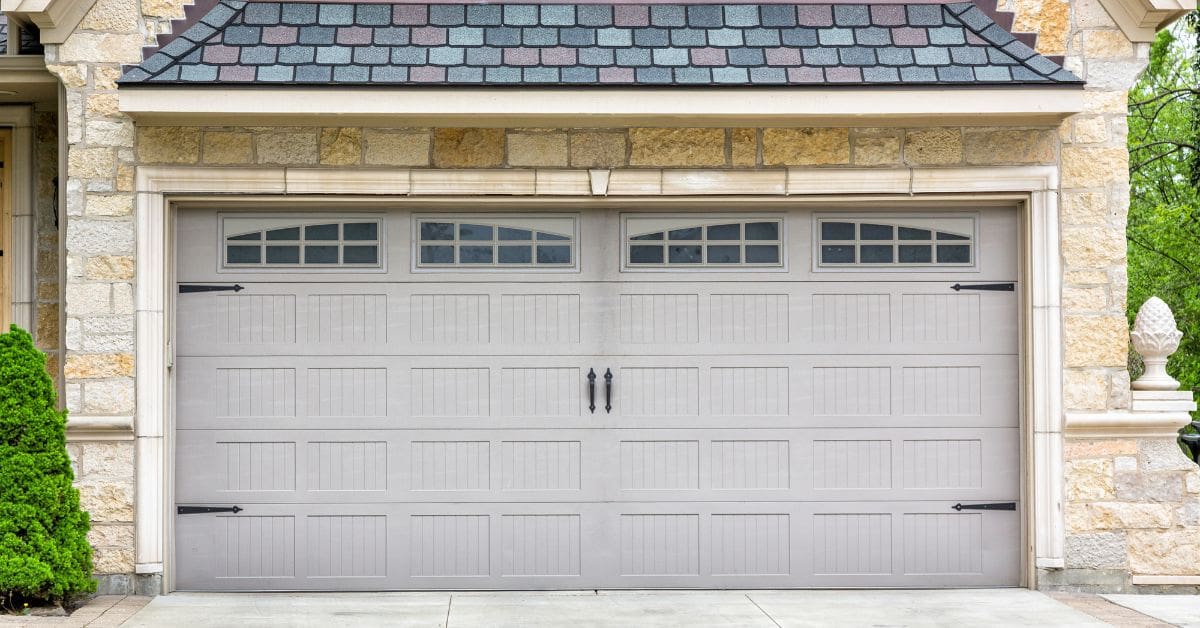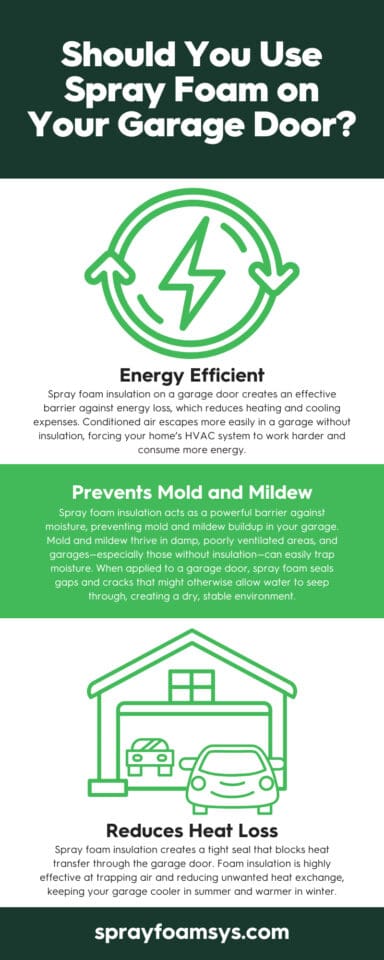
Insulating your garage door can significantly improve your home’s energy efficiency and indoor comfort while extending the life of your garage door. As a highly effective insulator, spray foam offers unique benefits compared to other materials, making it a top choice for homeowners. Let’s explore the benefits of spray foam on your garage door, focusing on its impact on energy efficiency, durability, and cost savings.
Why Insulation Matters for Your Garage
Homeowners often underestimate the need for insulation in the garage. However, it can have a substantial impact on both your home and your utility bills. An insulated garage door helps to maintain a steady temperature, reducing heat exchange between your home and the outdoors.
Hot or cold air easily seeps into uninsulated garages, especially through the garage door, creating temperature fluctuations. Frequent temperature changes can increase energy usage as your heating and cooling systems work harder to stabilize indoor conditions.
Benefits of Insulating Your Garage Door With Spray Foam
Adding spray foam insulation to your garage door enhances the space’s thermal efficiency, protecting it from extreme temperatures and helping to regulate indoor conditions. Insulated garage doors contribute to lower energy bills by reducing the amount of heat entering or leaving the space. When you understand why you should use spray foam on your garage door, the choice becomes even clearer due to the product’s versatility, efficiency, and added comfort.
Energy Efficient
Spray foam insulation on a garage door creates an effective barrier against energy loss, which reduces heating and cooling expenses. Conditioned air escapes more easily in a garage without insulation, forcing your home’s HVAC system to work harder and consume more energy.
Installing spray foam insulation on your garage door minimizes energy waste and lowers utility costs over time. Why you should use spray foam on your garage door becomes even more apparent when considering the long-term cost savings on energy bills.
Prevents Mold and Mildew
Spray foam insulation acts as a powerful barrier against moisture, preventing mold and mildew buildup in your garage. Mold and mildew thrive in damp, poorly ventilated areas, and garages—especially those without insulation—can easily trap moisture. When applied to a garage door, spray foam seals gaps and cracks that might otherwise allow water to seep through, creating a dry, stable environment.
The closed-cell structure of spray foam insulation blocks air and water vapor, minimizing condensation within the garage. Traditional insulation materials, like fiberglass, can absorb moisture over time and create an environment where mold and mildew can flourish. Spray foam resists moisture infiltration so your garage door stays dry, even in high-humidity conditions or extreme weather.
Reduces Heat Loss
Spray foam insulation creates a tight seal that blocks heat transfer through the garage door. Foam insulation is highly effective at trapping air and reducing unwanted heat exchange, keeping your garage cooler in summer and warmer in winter.
An insulated garage door maintains a consistent indoor environment, so your HVAC system doesn’t need to compensate for temperature changes. Higher efficiency reduces energy consumption and directly lowers heating and cooling costs. At Spray Foam Systems, we provide the spray foam insulation supplies you need. We know firsthand the difference this insulation can make for homeowners.
Saves Money Over Time
Garage door insulation with spray foam can lead to significant energy savings over time, making it a cost-effective investment. While spray foam may have a higher upfront cost than other materials, it provides long-term benefits that outweigh the initial expense.
Homeowners who invest in spray foam insulation see reductions in energy costs, often saving hundreds of dollars each year. As a result, this insulation pays for itself in energy savings within a few years, making it an excellent choice for those looking to save on home expenses in the long run.
When you add spray foam insulation to your garage door, you reduce reliance on heating and cooling systems, lowering the strain on your HVAC system and extending its lifespan. We at Spray Foam Systems take pride in helping homeowners save on energy costs with our high-quality spray foam products.
Provides a Durable, Long-Lasting Solution
Spray foam insulation is durable and resilient, making it a valuable, long-term investment for garage doors. Unlike traditional insulation materials that may require frequent maintenance or replacement, spray foam stays in place, providing effective insulation for many years. Spray foam is a reliable insulation material that withstands temperature changes, moisture, and other environmental challenges without losing effectiveness.
Strength and Resilience of Spray Foam
The composition of spray foam makes it highly resistant to wear and tear, even in demanding environments like garages. Spray foam maintains its structure and insulation properties in various weather conditions, insulating your garage door for the long haul. Unlike other insulation options that may sag, deteriorate, or lose effectiveness over time, spray foam remains intact to protect your garage from extreme weather, pests, and moisture.
Spray foam insulation also acts as a barrier to sound, which can benefit homeowners who want a quieter environment. Garages are often noisy, especially if used as workshops or hobby areas. Spray foam’s sound-dampening quality adds a layer of comfort by minimizing noise transmission between the garage and the rest of the home.
Low Maintenance
Once applied, spray foam requires very little maintenance, making it an ideal choice for busy homeowners. Traditional insulation materials add up in both cost and effort because they need periodic adjustments, replacements, or additional layers over time. With spray foam, homeowners get a low-maintenance solution that retains its form and insulating power without constant upkeep.
Spray foam also prevents mold growth thanks to its moisture-resistant properties. In humid or damp environments, mold can damage other types of insulation, leading to potential health issues and costly repairs. Spray foam’s ability to resist moisture means it stays in excellent condition and reduces the need for maintenance. It protects your garage door and the garage itself from moisture-related problems like mold and mildew.
It’s often expensive and difficult to completely remove mold once it has spread through insulation or inner areas of a structure. Spray foam insulation works to seal areas without deteriorating and allowing moisture in.
Insulating your garage door with spray foam provides many benefits, from enhanced energy efficiency to long-term cost savings and durability. Spray foam offers a powerful barrier against temperature fluctuations, sound, and moisture, keeping your garage comfortable and functional. Spray foam is an excellent investment that pays off in comfort, savings, and reduced maintenance needs for homeowners looking to improve their home’s energy efficiency and add value.






